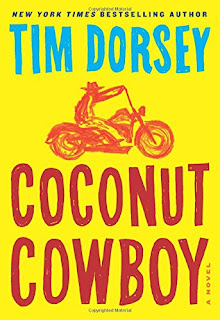2012;
579 pages. New Authors? : Yes. Genre : Thriller; Genetics Gone Wrong. Overall Rating : 6½*/10.
Really, for an anthropologist like Jim Dutton,
it’s a dream job: raising and monitoring Umber, one of Smyth-Archer Chemists’
genetically augmented chimpanzees (bonobos, actually) in his own household.
It’s
not just the scientific research. Umber seems more human than ape; she watches television, goes shopping for groceries,
and cooks dinner. Furthermore, she’s grown
up alongside Jim’s 13-year-old, Brett, and the two have bonded like
sisters. They read Teen magazine together, and drool over Leonardo DiCaprio.
So
it’s easy to forget Umber is still the property of Smyth-Archer Chemists. But she is, and when SAC comes knocking one day on
Jim’s door, with the stated intention of taking Umber to Africa and rintroducing her to
the wild, there’s not much he and Brett can do.
It’s either never see Umber again, or at least accompany her to Africa
and be part of her forced transformation of habitat..
Guess which one they choose.
What’s To Like...
Dark Inheritance is
a thriller about genetic tinkering gone awry, so if you enjoyed the premise in
books like Michael Crichton’s Jurassic Park,
you’ll like this one as well. The book
divides into two halves. The first half
is mostly set in the USA, and develops the background story. To keep it from getting too dry (this is a
thriller, after all, not a drama), the Gears sprinkle in some mayhem
taking place in both Africa and Texas.
The second half of the book has plenty of action, and is mostly situated in a
small African country called Equatorial Guinea. I liked the descriptions of the place; you
get a feel for it without getting bogged down in an avalanche of details.
There are gobs of characters to meet and keep straight, both of the
human and simian variety. It’s gotta be
a challenge to develop several augmented apes into believable, 3-D characters,
but the authors do a good job here.
There’s
plenty of blood and gore, particularly in the second half, plus a couple attempted
rapes, and even some diarrhea to contend with.
The Africans are pretty much stereotyped, but the storyline plods along
to an acceptable climax. I very much
liked the way the character of “Sky Eyes” was resolved.
Kewlest New Word…
Benighted (adj.)
: in a state of pitiful or contemptible intellectual or moral ignorance.
Excerpts...
“Good God, Jim,
after all these years, you’re still in love with her. What any other woman on earth would give for
that kind of devotion.”
He shrugged. “She’s the mother of my daughter. I owe her something.”
“That, or you’ve
got monogamous genes.”
“No, I like
Levi’s, thanks.” (loc. 1077)
“God help you,
don’t you realize that eventually the press is going to learn about this? The professional community is already
whispering about it.”
“True.” Godmoore laced his hands together. “Fortunately, few people pay attention to
scientists. They’d much rather worry
about athletes and movie stars. We
expect a rather slow building of interest.
When reporters start sniffing around the SAC apes, we will take the
appropriate steps to defuse their interest.”
(loc. 2328)
Kindle Details...
Dark Inheritance presently sells for $5.99
at Amazon. This is kind of a one-off
book for the Gears, but they have a slew of other e-books available, including
their better-known “People of the” historical fiction series set in pre-Colombian Native
America. Most of their books are in the $5.99-$8.99 price range.
“You wouldn’t believe what
happened at the last faculty meeting. We
caught one of the archaeologists digging up dirt about people’s pasts.” (loc. 1046)
There’s
nothing wrong with Dark Inheritance, but by
the same token, nothing really excited me about it either. The plotline has almost zero twists to it;
once the Duttons get to Africa, you can pretty much predict everything that’s
going to happen.
Worse, the plotline is almost a duplicate of a book I read a while back,
Robin Cook’s Chromosome 6 (reviewed here). Indeed, the two tales are so alike
– to the point of where both involve bonobos running amok in a man-made compound in Equatorial Guinea,
that I’m surprised cries of plagiarism didn’t arise. Oh well, at least the ending here is better
than Cook’s, which remains at the top of my list for the worst ending ever penned by a
recognizable, published author.
6½ Stars.
Yeah, I know, it’s been a while since
I’ve posted a review. Alas, I had some
serious heart trouble in early July, and I am only now getting back to reading
for extended periods. But every day gets
slightly better, and hopefully the worst is behind me.








